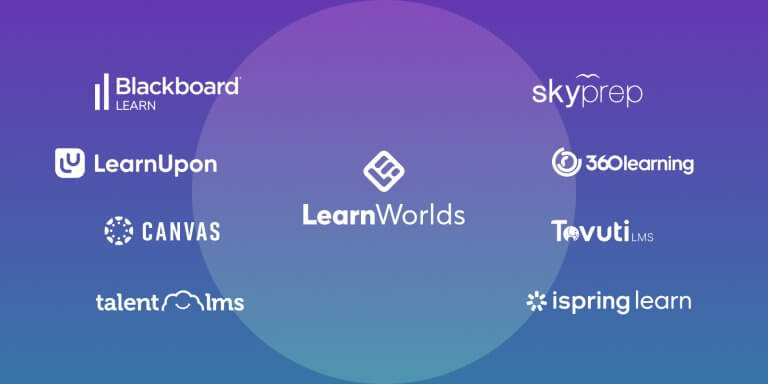Table of Contents
As a small business owner, you have a lot on your mind. Employee training might not be on your high-priority list because you lack the human resources or budget. But did you know that skills training is closely linked to employee retention? From your new hires to seasoned members of your workforce, modern employees feel strongly about their career development.
So much so if their company doesn’t provide them with training opportunities.
What you need to offer training is not a hefty budget or a large team of experts—you just need the right technology. Shifting from on-site to elearning courses can get a lot off your plate. Using a Learning Management System (LMS) can help you offer a centralized learning hub where employees can both find self-paced training material and join live sessions.
Not only that, an LMS can help you cut down on development costs because you only have to build your learning programs once and then update them occasionally to keep them relevant. There’s no need to start over every time a new employee joins or a minor change occurs.
Let’s review what the best LMSs for small businesses offer to help you choose a platform that fits your goals, features, and budget.
Does a small business need an LMS?
Yes, an LMS can make a real difference for small businesses. It helps you handle training, onboarding, compliance, and upskilling without all the hassle of traditional face-to-face methods. With an LMS for small businesses, you can deliver the same learning experience to everyone, track how workers are doing, and grow their training as the company grows. It’s worth the money because it makes people more productive and helps you keep up with competitors.
How to choose the best LMS for a small business?
Picking the right LMS software for a small business means knowing what your organization wants to do, working out what features you really need, and making sure it fits your budget and team size. If you follow a clear process, you’ll make a choice you feel good about that works for both what you need now and where you want to go.
1. Identify your training goals
Start by being clear about what you want your small business LMS to do. Are you mostly focused on getting new people up to speed, making your current workers better at their jobs, staying within regulations, or helping people learn when they’re not in the office? What you want to achieve will decide what kind of LMS works best for your business.
2. Define your must-have small business LMS features
Make a list of the things your LMS for small companies absolutely needs to have based on your goals. This might be things like working on phones, letting you make your own courses, seeing how people are progressing, testing what they’ve learned, working with other tools you use, and creating reports. When you know what matters most, you won’t spend money on stuff you don’t need.
3. Determine your budget
Small businesses should look for pricing that can grow with them and fits what they can afford. Think about not just what it costs to start, but also what you’ll pay each month, training, help when things go wrong, and any extras you might want later. When you know what you can spend, it’s easier to rule out options quickly.
4. Start your LMS research
Now you need to see what’s out there. Read what other people think, ask for demos, and look at different platforms side by side. Try to find a learning management system for small teams that is easier to use and has more flexible pricing.
5. Send out RFPs
An RFP template lets you get detailed answers from LMS companies based on what you need. This step helps you compare them fairly and makes sure they can do what you need technically, functionally, and at a price you can afford.
6. Speak with stakeholders
Before you make your final choice, talk to the important people in your company—like managers, team leaders, and IT staff. What they think can help you spot other needs or possible problems, and make sure the LMS you pick will be used properly across the business.
9 features of an LMS for small business
Is an LMS for small business supposed to have fewer features? Not at all. Instead, a small business LMS needs to have the right features:
Upon that last point, Geoffrey Bourne, Co-Founder at Ayrshare, shares his own insights related to the features that are worth looking more into when choosing an LMS for your organization:
“Robust audit trails and automated certification tracking are essential and act as the backbone for demonstrating regulatory compliance. For businesses in highly competitive industries, these tools act as strategic assets. Publishing proof of current certifications and training demonstrates your commitment to operational excellence and positions your team as experts in their fields.”
Best learning management systems for small businesses
These are the best Learning Management Systems for your small business. They’re all cloud-based LMSs for small businesses and come with rich functionalities that make them suitable for all types of online training programs, from new employee onboarding to compliance training and customer education.
The list below might also come in handy if you are looking for suitable employee training software for a small business, specifically.
1. LearnWorlds – Our top choice🔥
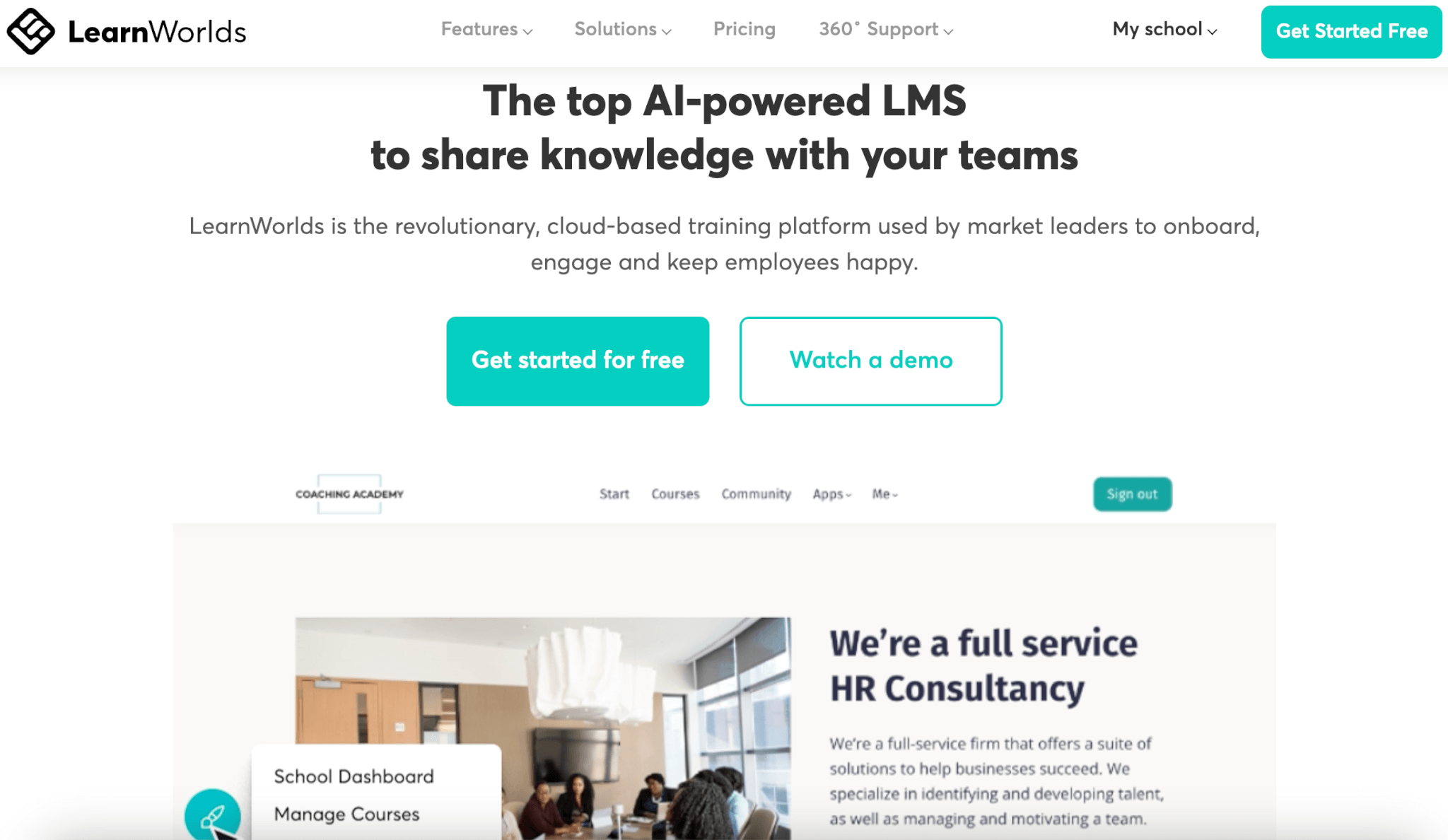





LearnWorlds’ employee training LMS is one of the most highly ranked tools. Our platform offers a smooth user experience in a modern learning environment. It enables you to build your training courses fast and is suitable for all your training needs, internal and external.
Key features include multimodal learning and personalized learning paths, mobile learning via branded mobile apps, and built-in authoring tools to add interactivity to your ebooks and videos. We also have an advanced AI assistant featuring pre-built prompts, with the ability to create or repurpose content.
Our assessment builder is also impressive, supporting more than 17+ question types and offering advanced settings like:
As for analytics, they go into as much detail as it gets. You’ll get insights into learner behavior with content, the performance and popularity of your courses, and, if you’re selling, sales reports. And if you want to get feedback directly from your employees, use our built-in survey builder.
Another key differentiator of LearnWorlds is that it’s ecommerce-ready, with numerous built-in integrations with payment gateways, email marketing tools, CRM, and more.
Highly scalable and automated, LearnWorlds supports multiple schools and also custom user roles and access controls, bulk actions, advanced security features (ISO 27001 certified and GDPR compliant), and multilanguage support.
Pros
Cons
Pricing
LearnWorlds offers a 30-day free trial with most features available, and the following pricing plans:
💁 For more information about feature availability per plan, visit our pricing page.
15,000+ brands trust LearnWorlds to train their people, partners & customers.
2. Canvas






Canvas LMS is a scalable, open-source learning management system for small companies that helps deliver dynamic, engaging learning. The platform supports online, in-person, and blended learning, all the while offering a centralized learning hub to share training resources. The platform automatically handles tasks like enrollment, payments, and certificates to minimize admin work for you.
Canvas API works with popular tools like Microsoft Teams and Zoom, while it also offers rich collaboration tools like messaging and groups. It helps you track learning through quizzes, a gradebook, and learning analytics. Learners have access to a customized dashboard with real-time data to view their progress. With Canvas Course Catalog, you can list your courses and sell them, if you wish, via your own branded marketplace.
Canvas LMS doesn’t support AI course creation, therefore depriving you of the opportunity to speed up the content development process and reduce costs.
Pros
Cons
Pricing
Canvas LMS doesn’t offer a free trial. Pricing is available upon request only.
3. Blackboard Learn






Blackboard Learn for Business is a long-standing learning platform that helps you streamline training and keep all learning materials in one place while integrating with the tools you already use. The platform offers personalized learning experiences, also available on mobile devices, while the rich assessment and reporting systems help you stay on top of learner progress and the training status in your company.
Blackboard Learn offers multiple learning features and the option to share real-time feedback. It facilitates collaboration with discussion forums, announcements, notifications, and messaging. A mobile app is also available, although it offers fewer features than the web version.
Blackboarn Learn has no ecommerce or white labeling capabilities. This can be problematic, especially if you wish to offer customer training.
Pros
Cons
Pricing
Blackboard Learn offers a 30-day trial. Pricing is available upon request.
4. TalentLMS
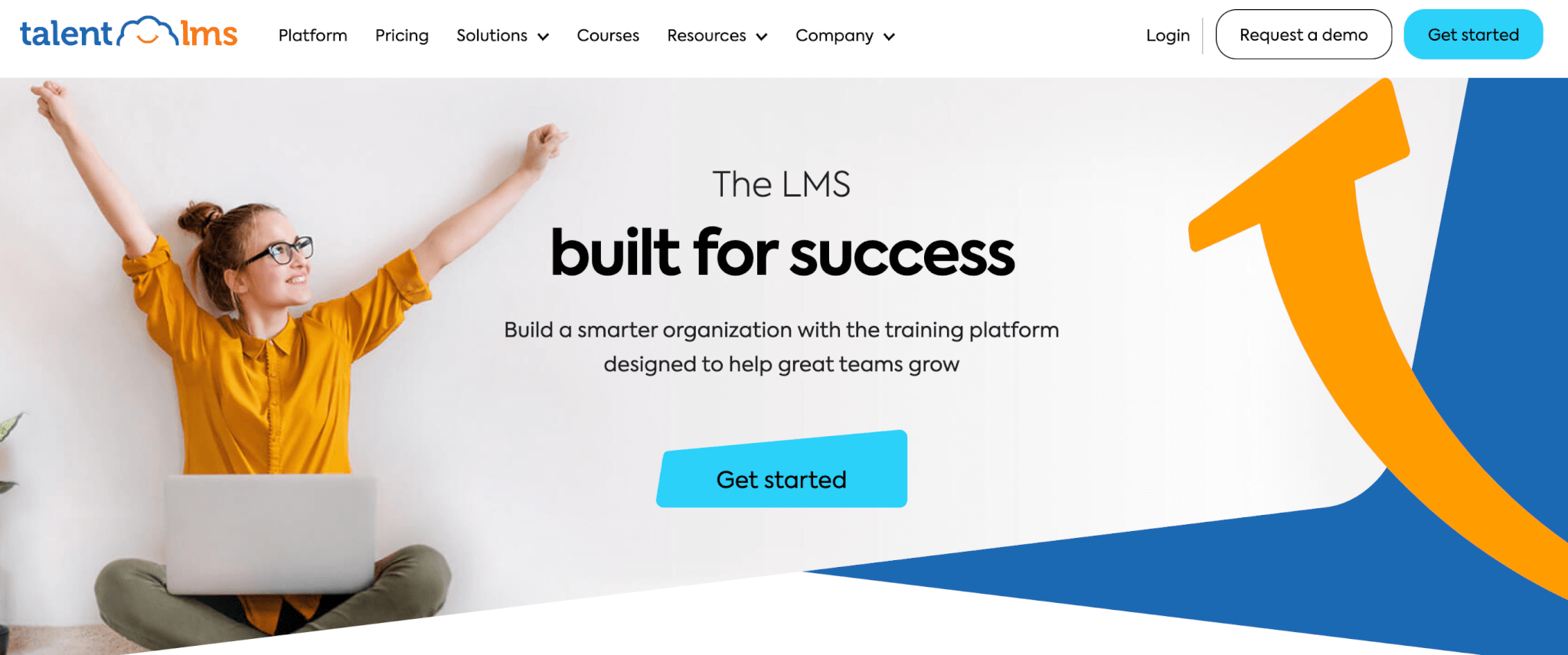





TalentLMS is known for its intuitive, user-friendly interface and its gamification features that include leaderboards, badges, levels, and points. TalentLMS is one of the best LMS platforms for small companies, and that is because it is very easy to set up and supports auto-enrollment, bulk imports, and account syncing from other platforms. It features a drag-and-drop course builder for easier course creation and multiple gamification options. TalentLMS recently introduced TalentCraft, its AI content creation tool.
The platform allows you to build custom learning paths based on rules and supports customizable sub-accounts/training portals (with limitations per pricing plan), admin task automation, and in-depth reporting with advanced features like scheduling and training infographics.
TalentLMS has limited ecommerce capabilities, so it may not be a good fit for customer education.
Pros
Cons
Pricing
TalentLMS offers the following monthly pricing plans for active users and registered users.
5. iSpring Learn
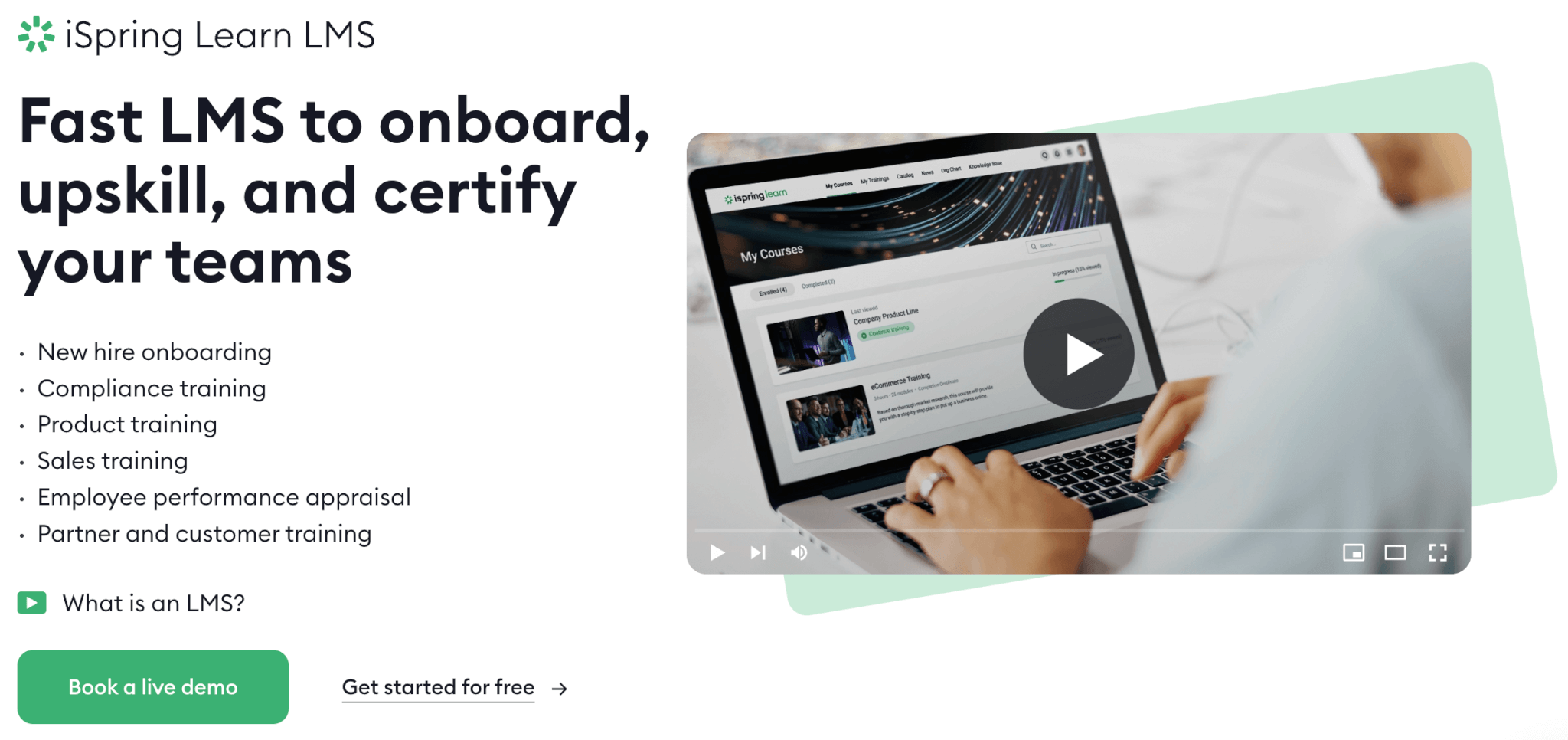





iSpring Learn is another intuitive LMS system to centralize training materials and deliver training for multiple use cases. iSpring promises to improve workflow through automations, multiple admin roles, and user groups while helping you upskill your employees. This LMS for small companies generates in-depth reports, offers a Supervisor Dashboard, and has a certificate management system.
To boost learner engagement, the platform supports diverse content types, from role plays to assessments, and features game mechanics and social learning like chats and newsfeeds. It also supports AI course creation for faster content development. Another benefit of iSpring Learn is the Events Calendar that allows you to manage all your training events, on-site and online, from one single dashboard.
Several customer reviews mention that the reporting system is complicated.
Pros
Cons
Pricing
iSpring Learn offers a 30-day free trial. All plans are billed annually and are based on the number of users.
Indicatively, in the START plan:
The BUSINESS plan comes with more functionalities and at a higher price:
6. 360Learning
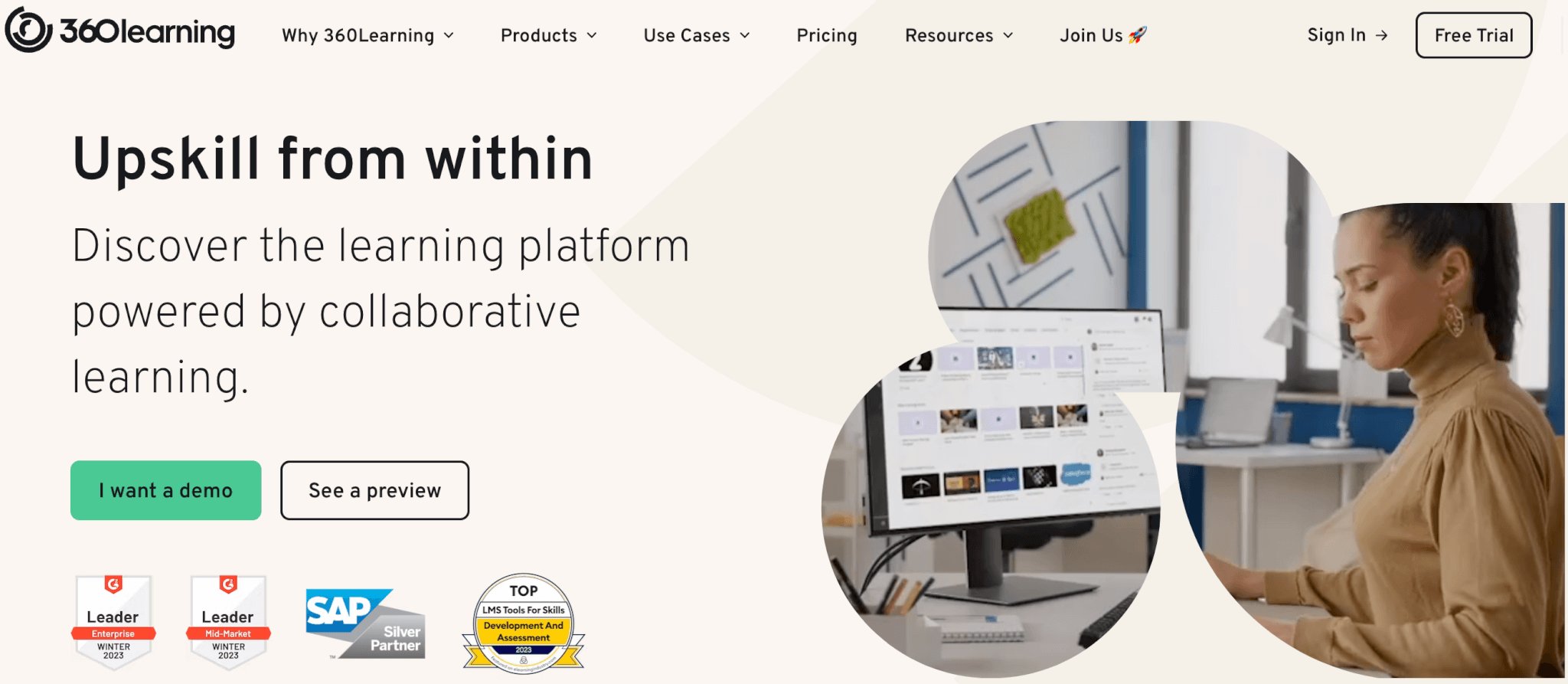





360Learning is an AI-powered small business LMS platform with a built-in system that enables you to identify skills gaps and build online courses and personalized paths relevant to your employees’ needs. It features a built-in video recorder and has a robust assessment builder with more than 10 question types.
The platform offers advanced options for user management, such as admin roles within user groups, user sync and workflows, self-registration with a magic link, and more. The platform’s AI assists with content creation and brings personalized course suggestions for users. 360Learning features several useful integrations, such as Zoom, HR tools, ecommerce, and Salesforce.
Although 360Learning is quite intuitive once you get the hang of it, customer reviews mention that navigating the platform and setting up a course can be confusing at first.
Pros
Cons
Pricing
360Learning offers a 30-day free trial and the following pricing plans:
7. LearnUpon
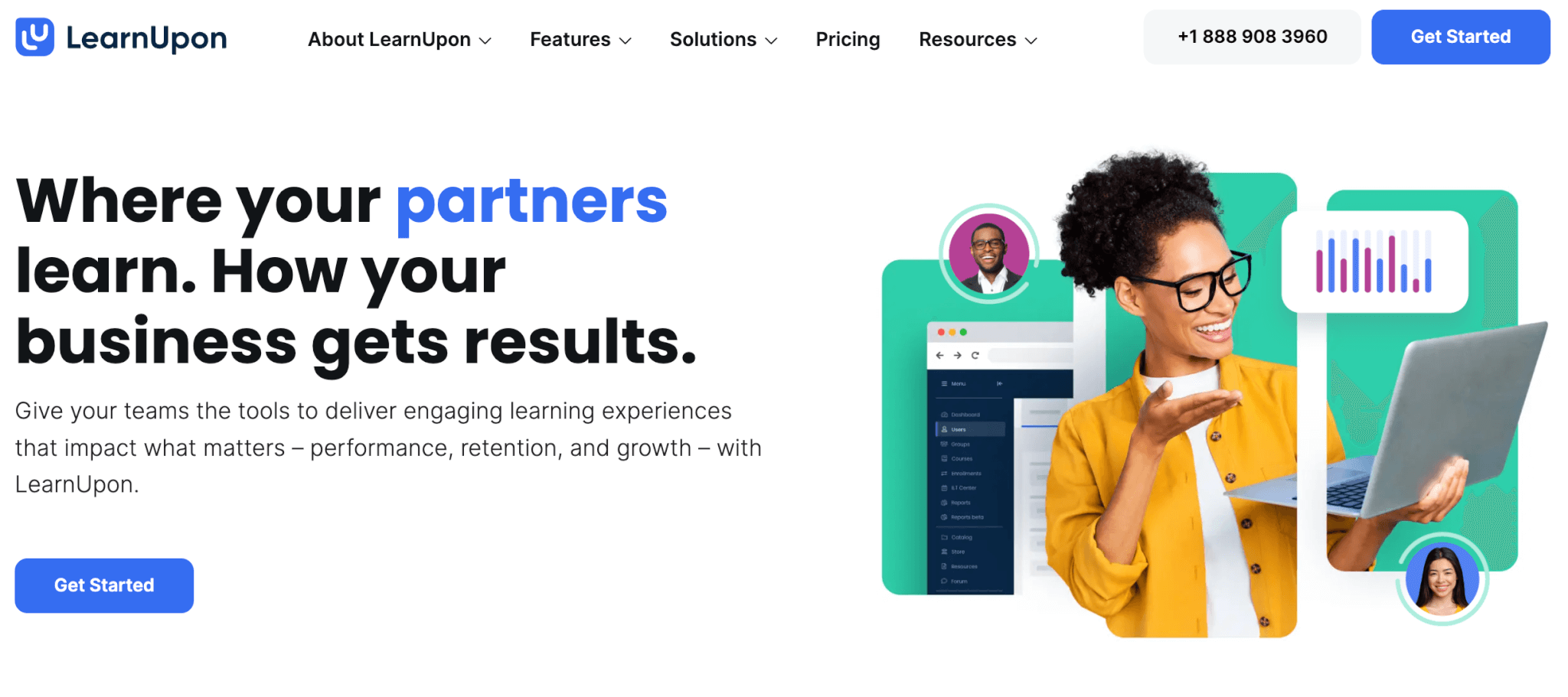





LearnUpon is an AI-powered LMS software for small businesses that allows you to create engaging training courses. The platform’s AI is one of the most advanced, as it assists with course creation and content recommendations. You can build separate branded training environments and easily share content and courses with each other.
LearnUpon also comes with gamification elements, certificates for finishing courses, and discussion boards to help keep learners interested.
The platform does the work of creating users and signing them up for you, and lets people register themselves, too, with user segmentation. You can also group users to manage them more efficiently. The advanced reporting tools let you show reports in other systems and schedule them to run automatically. That said, the actual reports you can get are fairly basic.
Several customer reviews mention that the Learning Paths are rather inflexible and don’t allow learners to navigate freely through the courses.
Pros
Cons
Pricing
LearnUpon doesn’t offer pricing information on its website, but they do mention the pricing plans available.
8. Tovuti
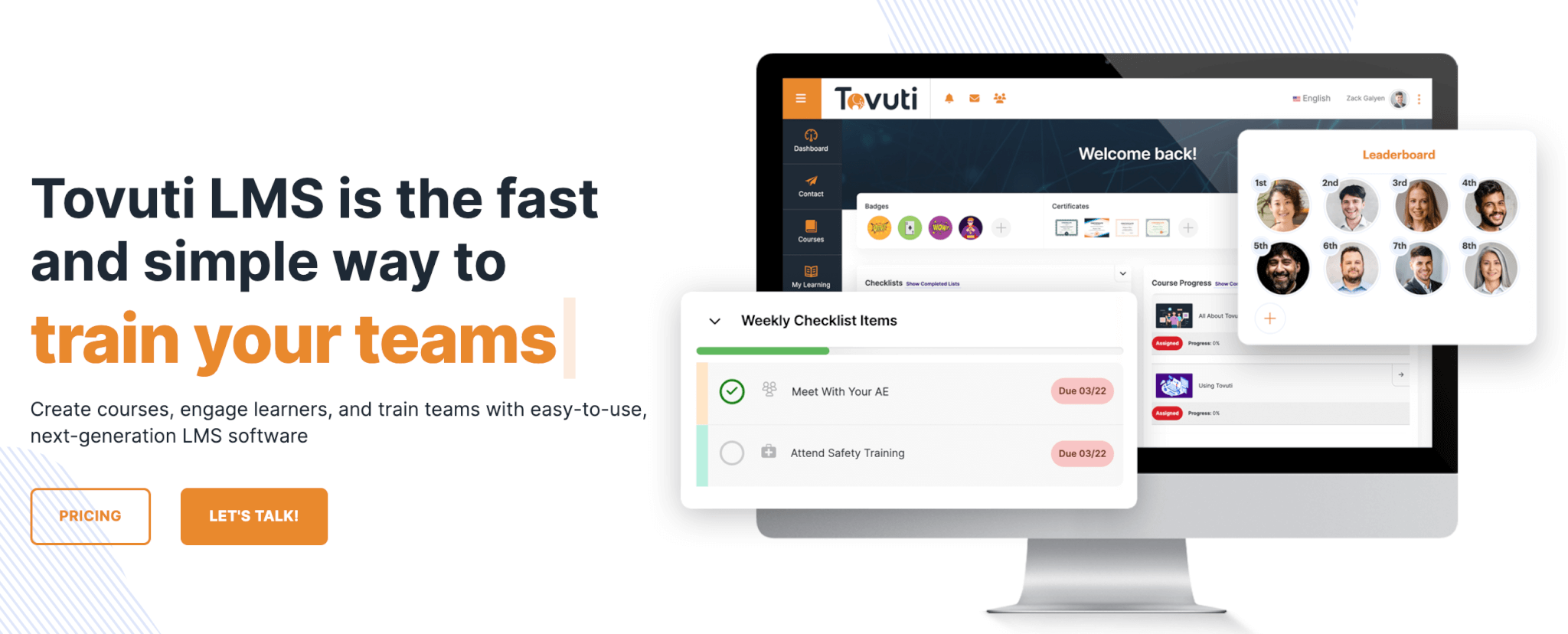





Tovuti LMS offers a training solution for small to medium businesses with features like content management tools, built-in video conferencing tools for your live sessions, and a native mobile app.
The platform is also fully white-labeled and highly scalable, supporting 2,000+ API integrations, custom user roles, separate branded portals, and an unlimited number of courses.
TovutiLMS supports AI course creation and allows you to build custom learning paths depending on your specific requirements. The platform also has deep reporting, is SCORM compliant, and has eCommerce tools.
Customer reviews repeatedly mention that Tovuti is a bit pricier than similar LMS solutions and that customer support is unresponsive.
Pros
Cons
Pricing
Pricing is available upon request only.
9. CYPHER Learning
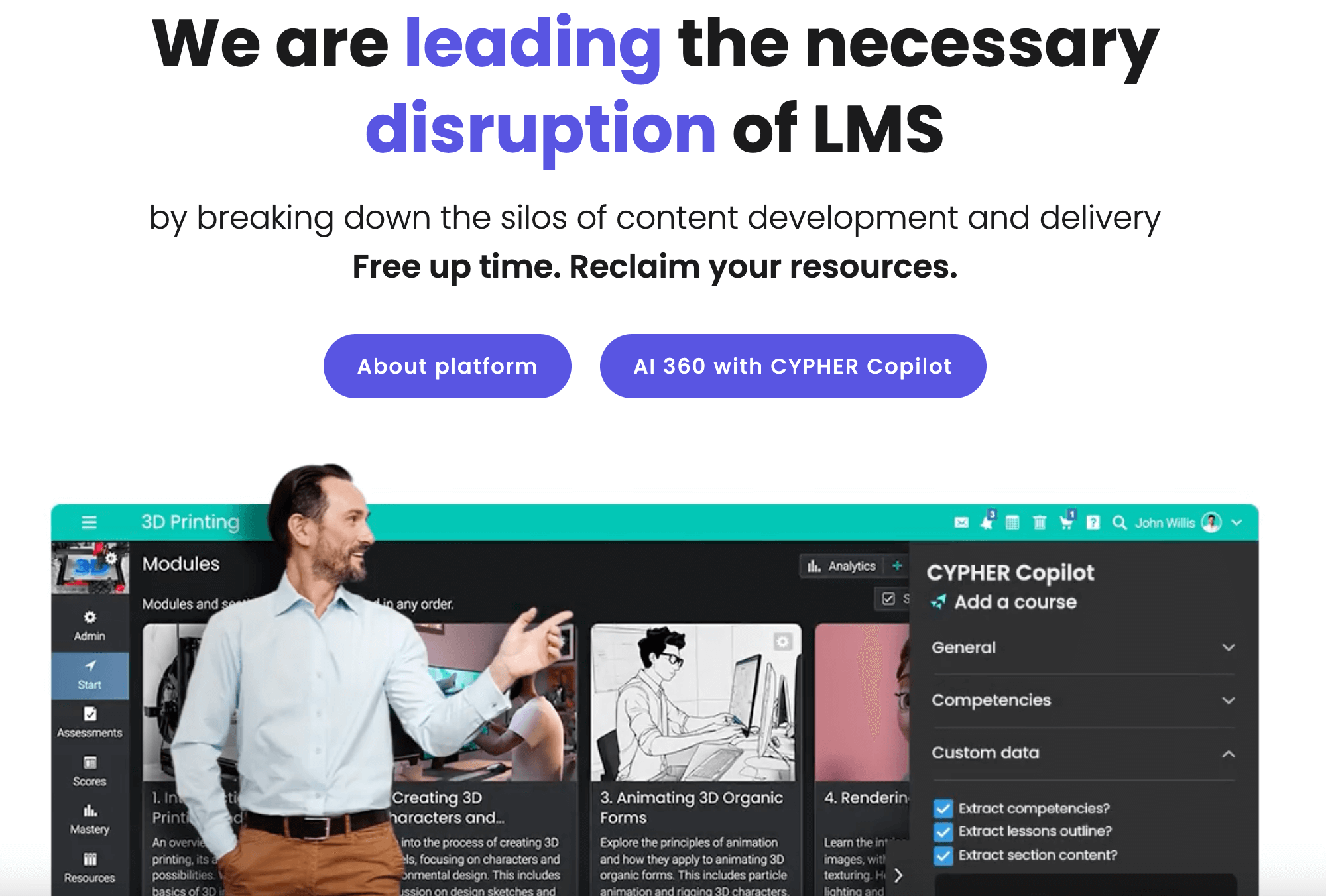





CYPHER Learning is an intuitive Learning Management System for small companies that puts a different spin on online learning, emphasizing human connection. It supports multiple content formats and helps you build social and gamified learning experiences with games, leaderboards, chat, and discussion forums.
Leveraging the built-in assessments available, you can build competency-based and custom-tailored training. CYPHER Learning also has an AI-powered content creation tool with embedded gamification, offered at an extra cost.
The platform is highly scalable, supporting 50 languages, multiple built-in integrations, and API. It offers 25 automated actions to replace manual work. Plus, it offers the MATRIX LMS mobile apps for iOS and Android for learning on the go and is SCORM compliant.
CYPHER Learning might be an expensive LMS for a small business.
Pros
Cons
Pricing
Pricing is available upon request.
10. SkyPrep
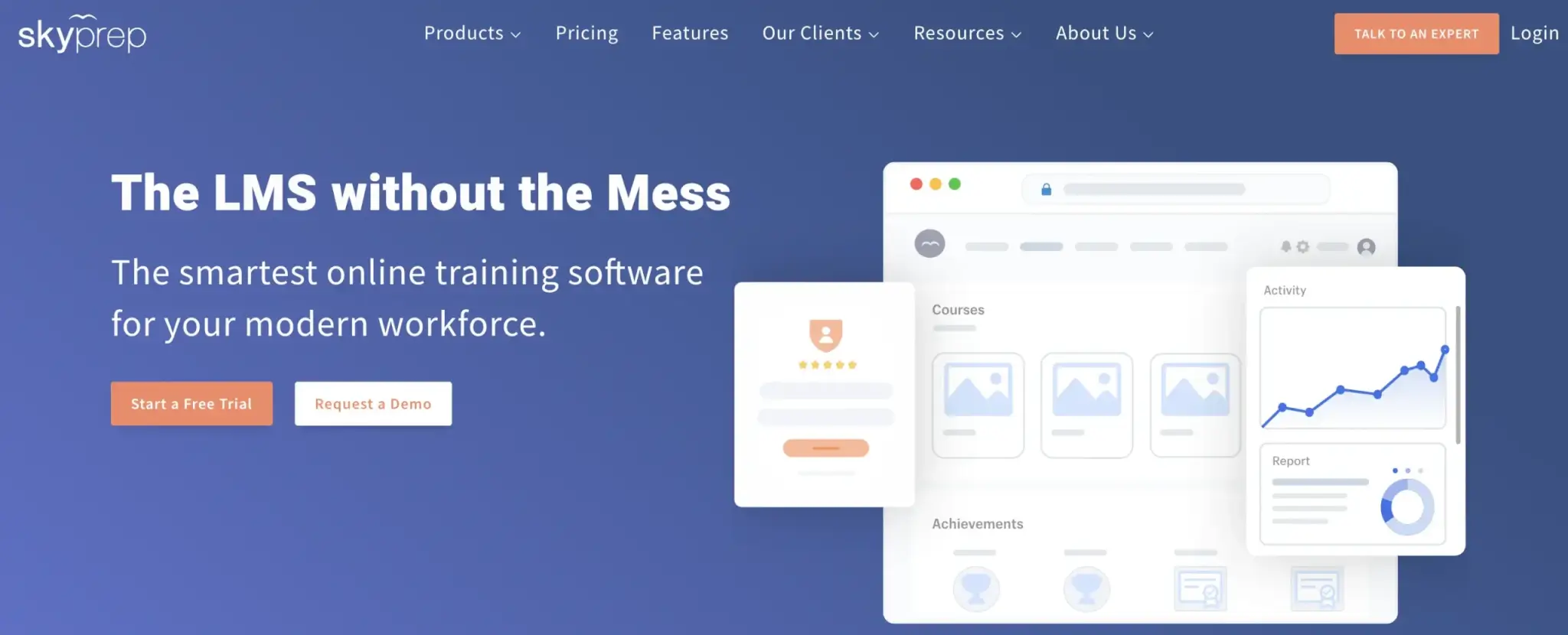





SkyPrep is an intuitive platform with rich LMS features that supports multiple types of content and allows for content authoring in the platform. It enables you to create course checklists to build learning paths and has advanced gamification, custom course certificates, and a built-in blog to enhance engagement.
The platform has a dashboard with key training metrics and built-in, customizable reports, although the reports could be more in-depth. On the admin side, you can set automated notifications and auto-enrollment, or schedule reports. The platform is scalable and allows you to create separate learning environments that you can customize and easily share content among them.
SkyPrep doesn’t have an AI assistant for content creation, which is a disadvantage if you plan to develop content on your own.
Pros
Cons
Pricing
SkyPrep offers a 14-day free trial. Pricing is available upon request.
💁🏻Looking for an affordable learning management system? Check these 7 budget-friendly LMS solutions to boost your training programs.
11. Moodle
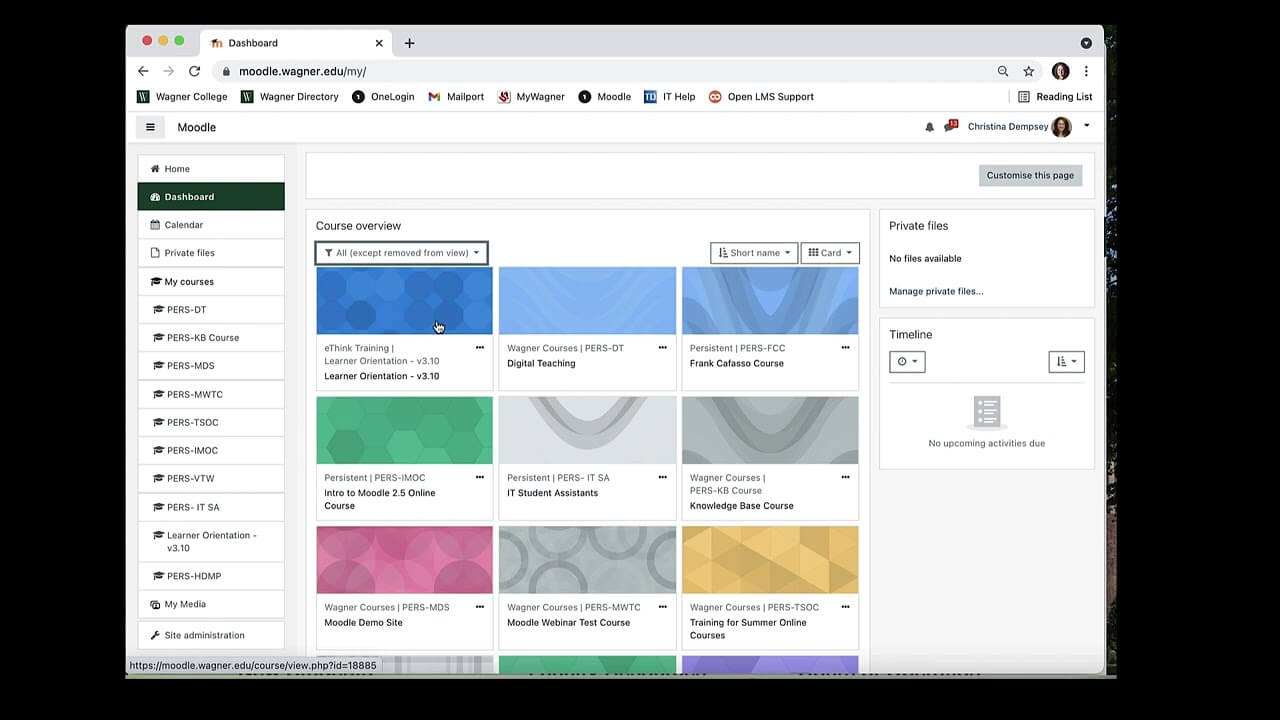





Moodle is a widely adopted open-source learning platform, trusted by universities, nonprofits, and small businesses alike. It offers a flexible and scalable solution for course delivery, assessments, certifications, and social learning.
With community support and thousands of plugins, it can be fully customized to fit unique training workflows. For organizations with internal IT support or access to managed hosting, Moodle provides a cost-effective and adaptable LMS for small businesses.
The platform’s ability to support SCORM, xAPI, multiple content formats, and robust admin controls makes Moodle useful for compliance training, onboarding, and skills development across distributed teams. It’s ideal for companies seeking one of the best LMS for small businesses that doesn’t lock them into monthly fees or limited features.
Pros
Cons
Pricing
Pricing is available upon request.
12. Kajabi
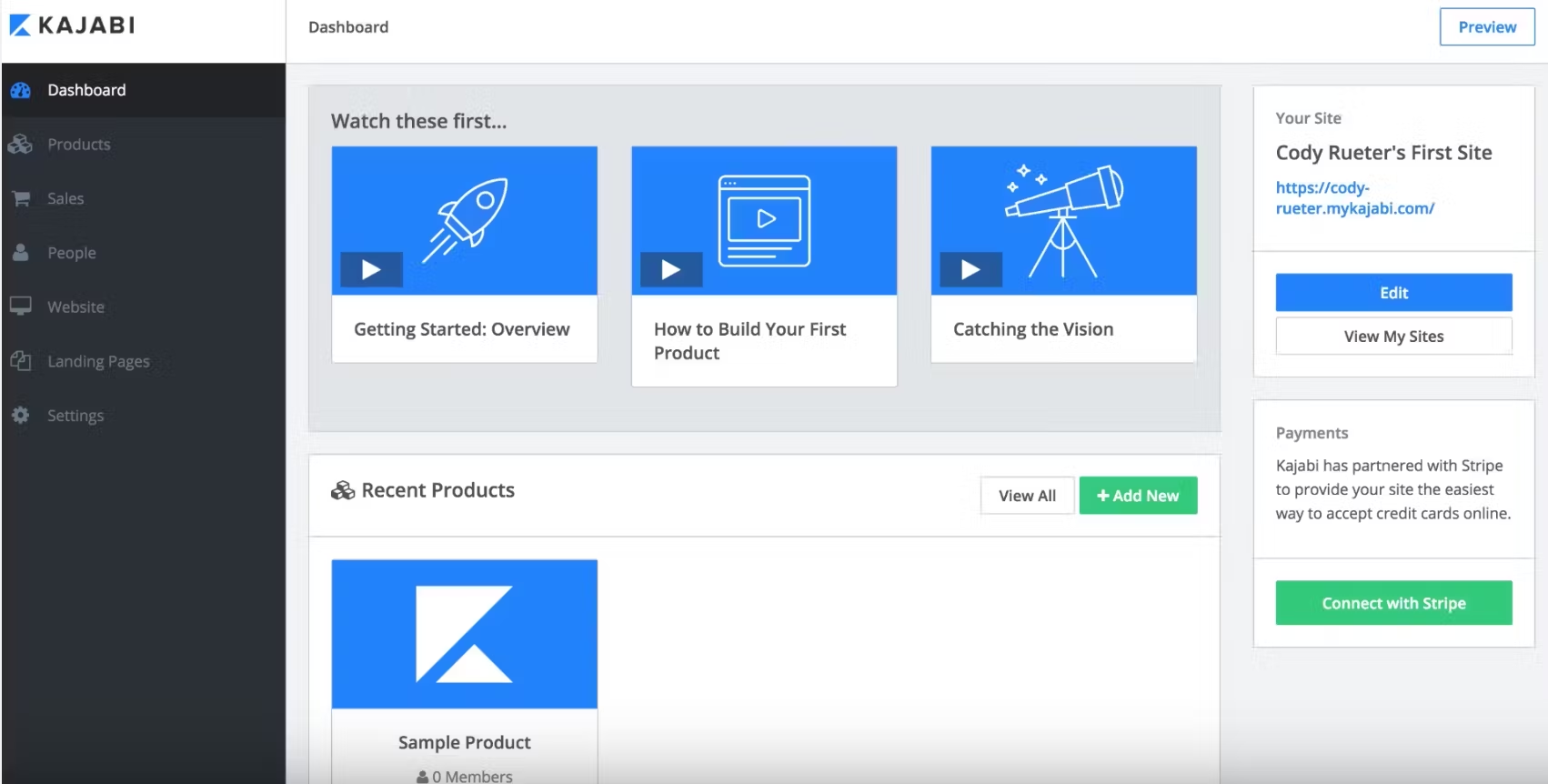





Kajabi is an all‑in‑one platform combining course delivery, marketing, and CRM. With an easy-to-use site builder, email automation, and sales funnel tools, it’s positioned as a marketing-driven LMS for small businesses selling online programs.
Kajabi helps small businesses monetize training while managing a brand experience. It includes blog, landing pages, and pipeline analytics, saving on multiple tools. It’s a good choice if you’re looking for one of the best small business LMSs with commerce built in.
Pros
Cons
Pricing
Kajabi offers four pricing plans:
13. Podia
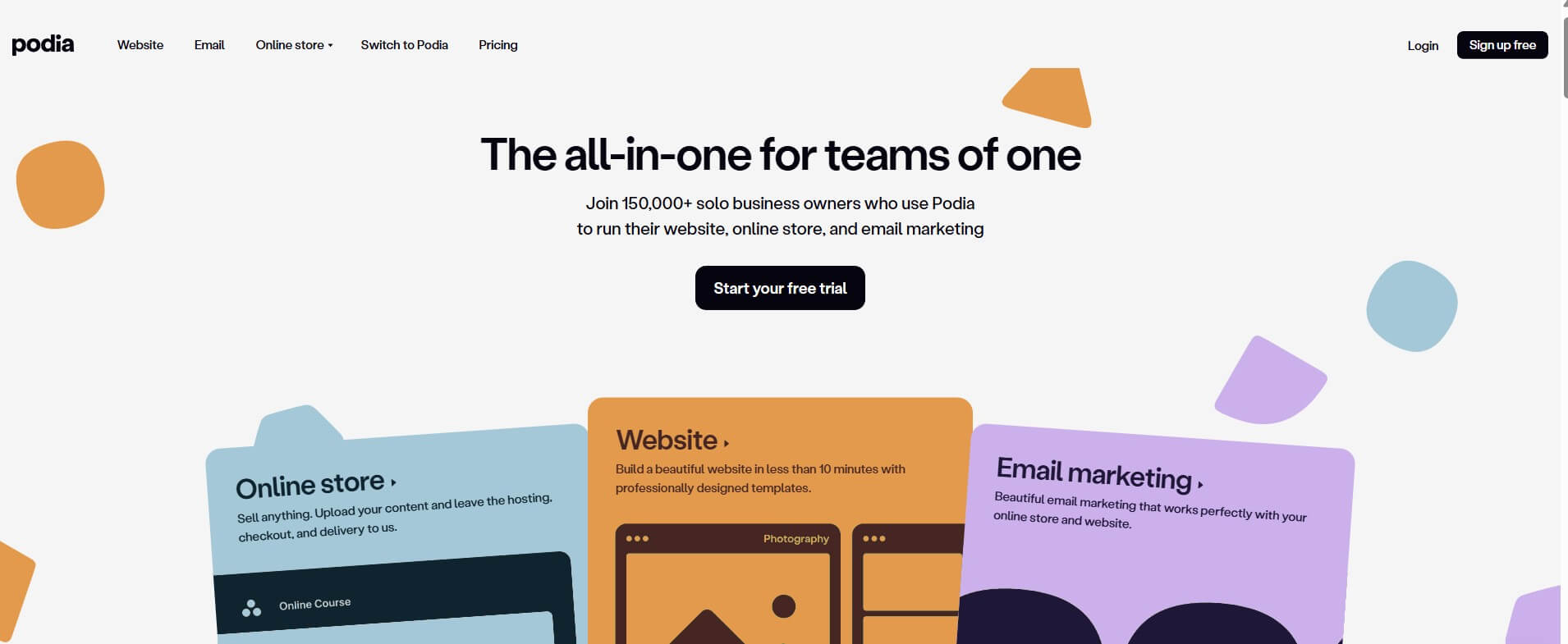





Podia is a streamlined platform for selling online courses, memberships, and digital products. Unlike complex enterprise tools, Podia offers quick setup, built-in checkout, and no transaction fees on paid plans—making it one of the best LMS for small businesses that want simplicity and sales support.
The platform supports drip content, email broadcasts, and affiliate tools, allowing coaches and small teams to launch fast. Podia is an LMS for small business that prioritizes speed and user-friendliness over complex enterprise features.
Pros
Cons
Pricing
Podia offers two main plans:
14. LearnDash
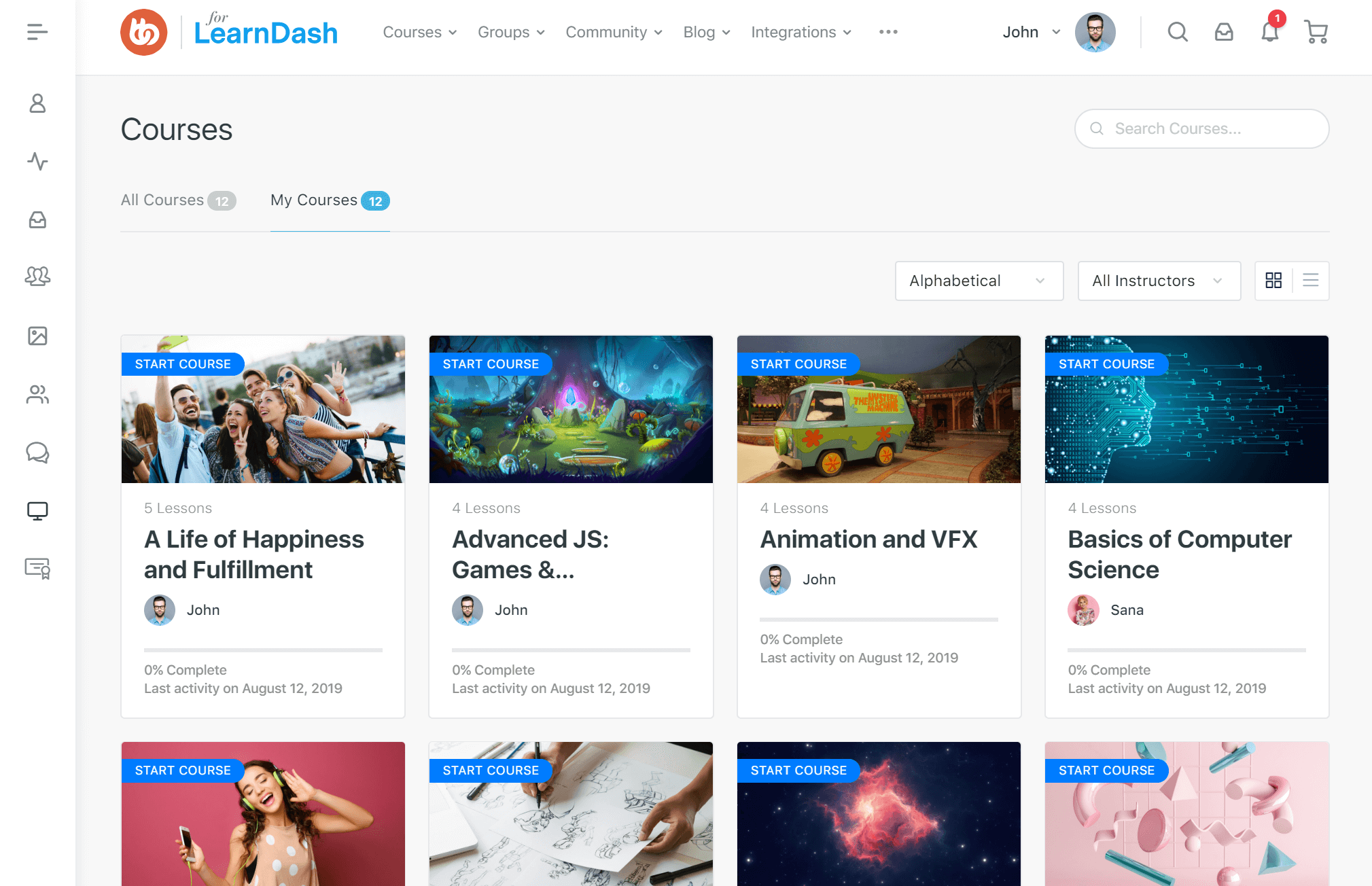





LearnDash is a WordPress plugin that adds LMS features to your existing website. With quizzing, drip schedules, certificates, and analytics, it’s among the best LMS for small businesses using WordPress. With the platform, you can create and sell courses without migrating off your site.
It’s one of the top learning management systems for small companies that already use WordPress, offering flexibility and site ownership. While add-ons and video hosting may add costs, the model (one-time annual fee) is appealing to cost-conscious teams.
Pros
Cons
Pricing
LearnDash offers three pricing plans:
15. Absorb LMS
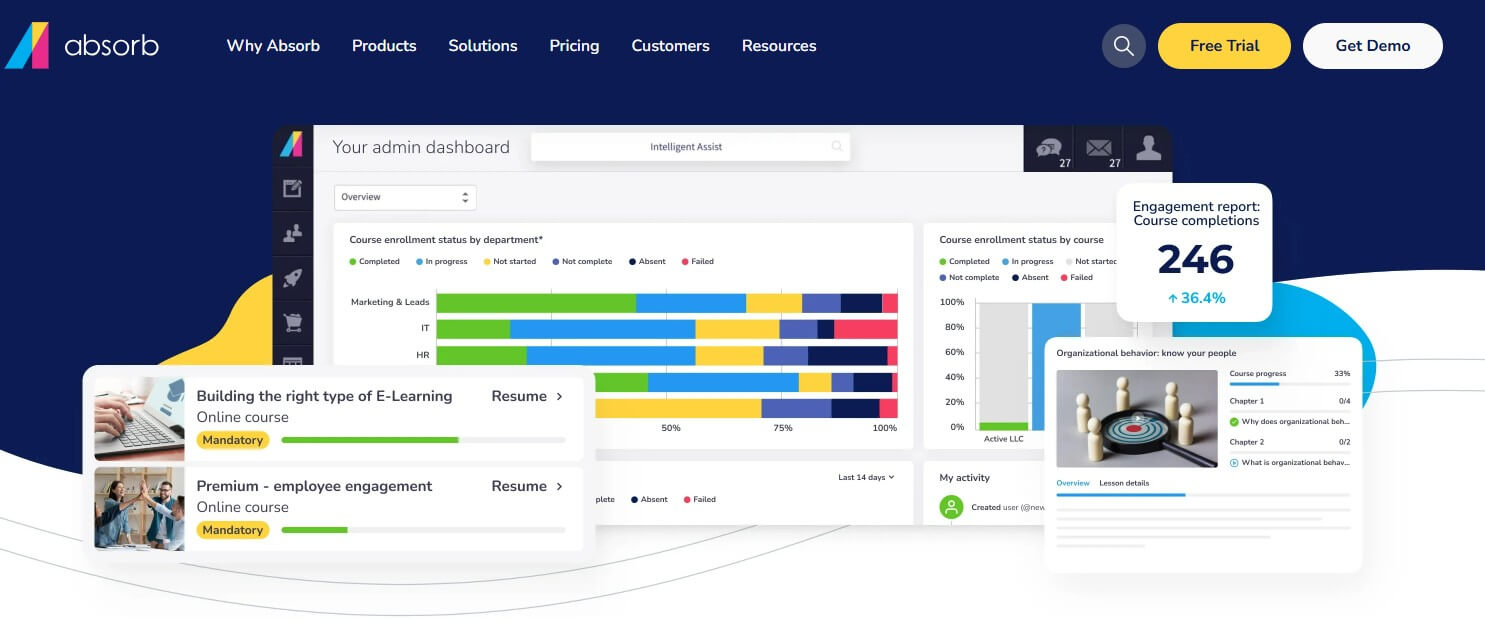





Absorb LMS is a cloud-based platform known for intuitive navigation, powerful automation, and compliance features. It supports SCORM/xAPI, blended learning, and ecommerce—ideal for small businesses ready to scale and train both internal teams and external learners.
The platform integrates with HRIS, CRM, and communication tools, enabling automated course enrollments, reminders, and robust reporting. With dedicated support and onboarding, Absorb is one of the best LMSs for small businesses that want enterprise-level features without enterprise-grade complexity.
Pros
Cons
Pricing
Available via quote and typically ranges based on user count and feature needs.
16. BrainCert
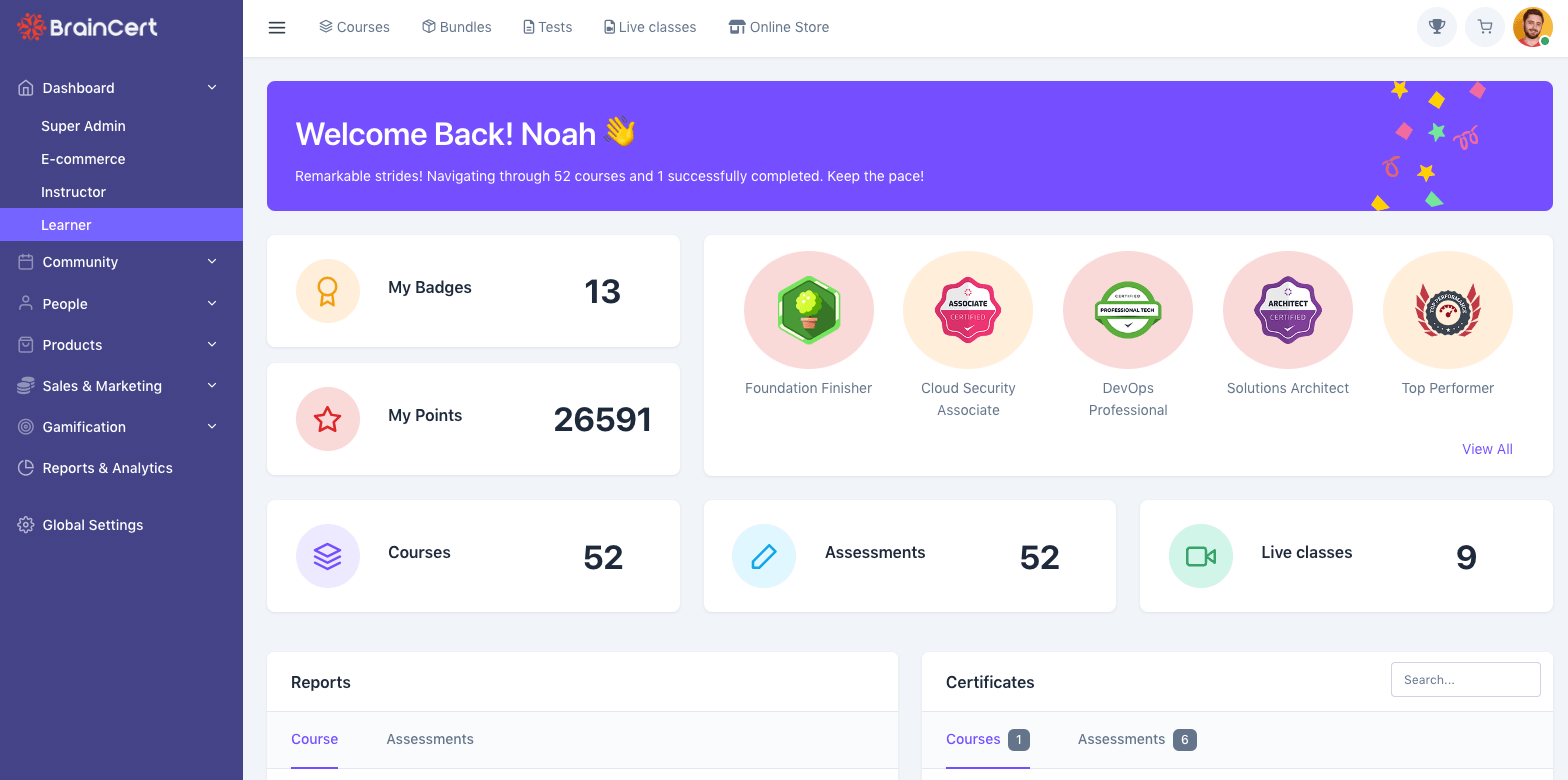





BrainCert is a feature-rich LMS and virtual classroom platform offering live sessions, whiteboard, assessments, and detailed analytics—all in a unified interface. It fits small training businesses or tutors delivering live online instruction.
The platform includes SCORM compliance, API access, and corporate training tools. It’s a reliable LMS for a small business that needs both on-demand courses and synchronous learning in one system.
Pros
Cons
Pricing
Three main monthly plans are available:
17. Continu
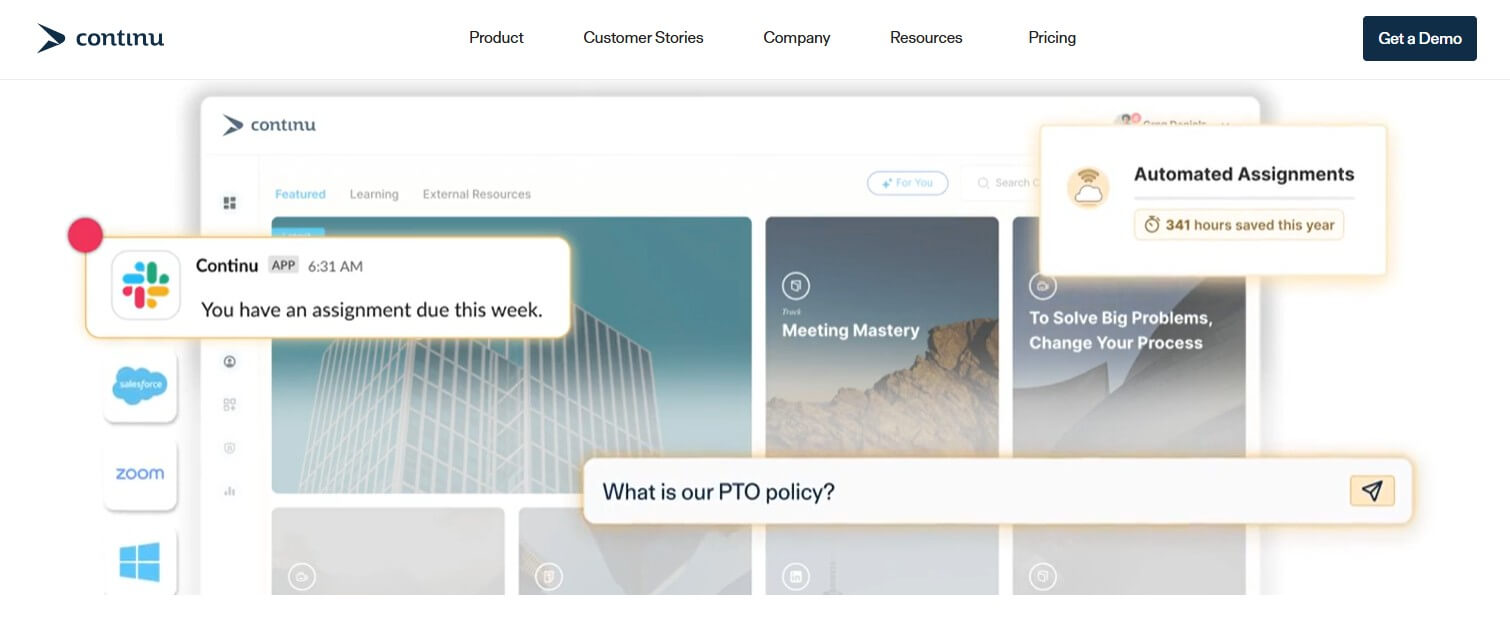





Continu is an easy-to-use LMS focused on content creation and learner experience. It offers course authoring, video hosting, certification paths, and collaboration tools—designed for learning teams seeking a platform that’s straightforward yet versatile.
The platform integrates with Slack, Salesforce, and other tools, making it effective for sales enablement, compliance, and training software for small business use. Continu supports blended and self-paced learning with configurable user dashboards and learning paths.
Pros
Cons
Pricing
Pricing is available upon request.
18. EasyLMS
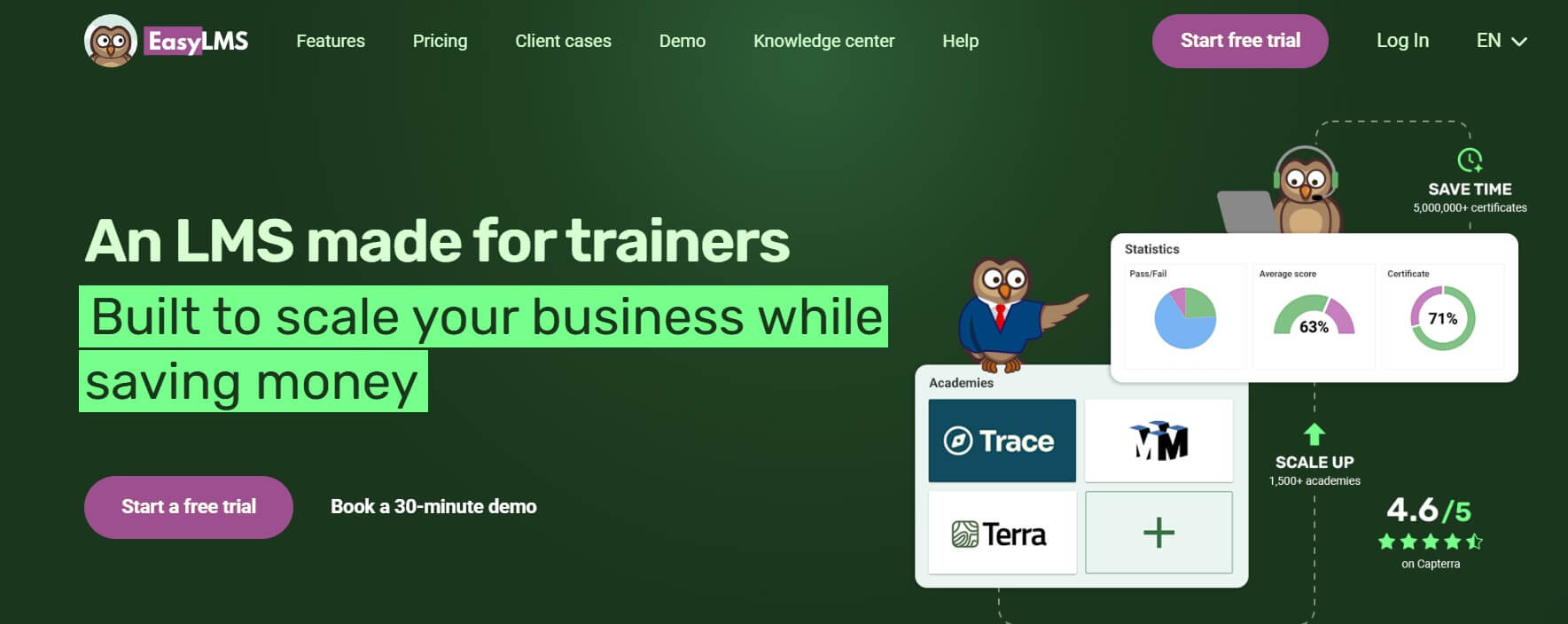





EasyLMS is a straightforward platform focused on assessment and compliance courses. It offers test and quiz creation, certification, and reporting tools—well-suited for regulated industries or organizations requiring formal assessments.
It’s an option for small companies needing simple yet effective training delivery, such as safety, onboarding, or compliance modules, without full advanced LMS complexity.
Pros
Cons
Pricing
Plans include:
19. Docebo
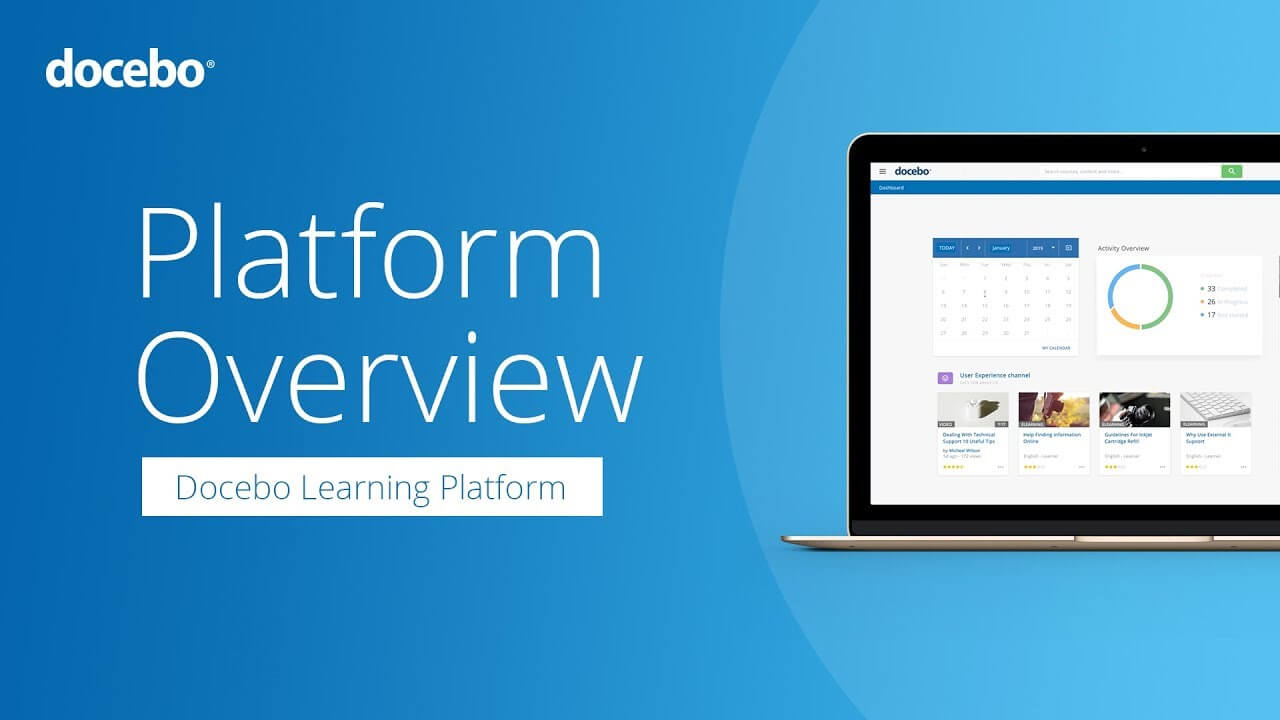





Docebo is an AI-driven, scalable LMS offering learning portals, social learning, and a marketplace of off-the-shelf courses. It targets companies seeking a flexible platform capable of serving employees, partners, and customers.
With AI recommendations, content suggestions, and robust tracking, Docebo is one of the best LMSs for small businesses aiming to combine learning experience platform (LXP) capabilities with traditional LMS features.
Pros
Cons
Pricing
Pricing is available upon request.
20. D2L Brightspace
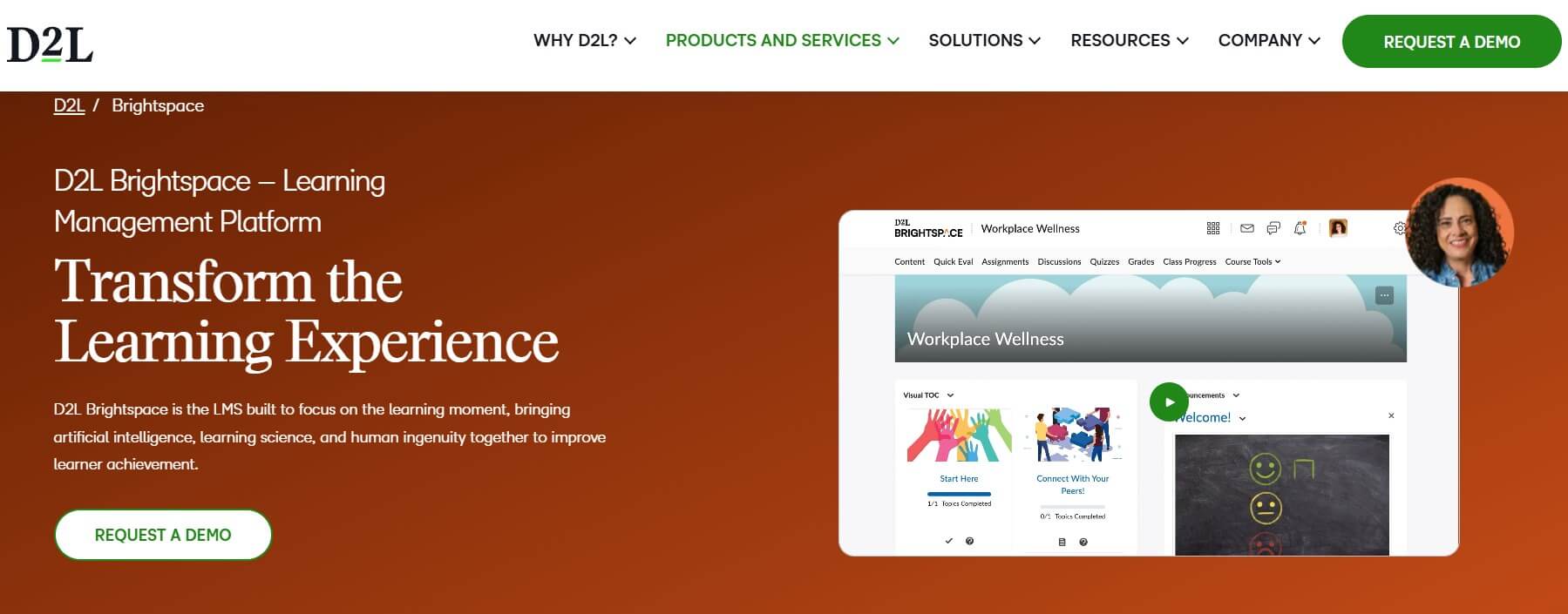





Brightspace is a flexible, enterprise-grade LMS that offers tailored learning experiences, rich content tools, HTML embeds, social learning, and automated grading. It’s one of the best LMSs for small businesses due to its adaptable setup and support—delivering a strong combination of traditional LMS features and modern UX.
Admins in small company settings cite its intuitive interface, robust reporting, and ability to manage both internal and external learners efficiently. While slightly more enterprise-focused, it’s still a compelling LMS for small businesses wanting powerful features and scalability.
Pros
Cons
Pricing
Pricing is available upon request.
21. Gurucan
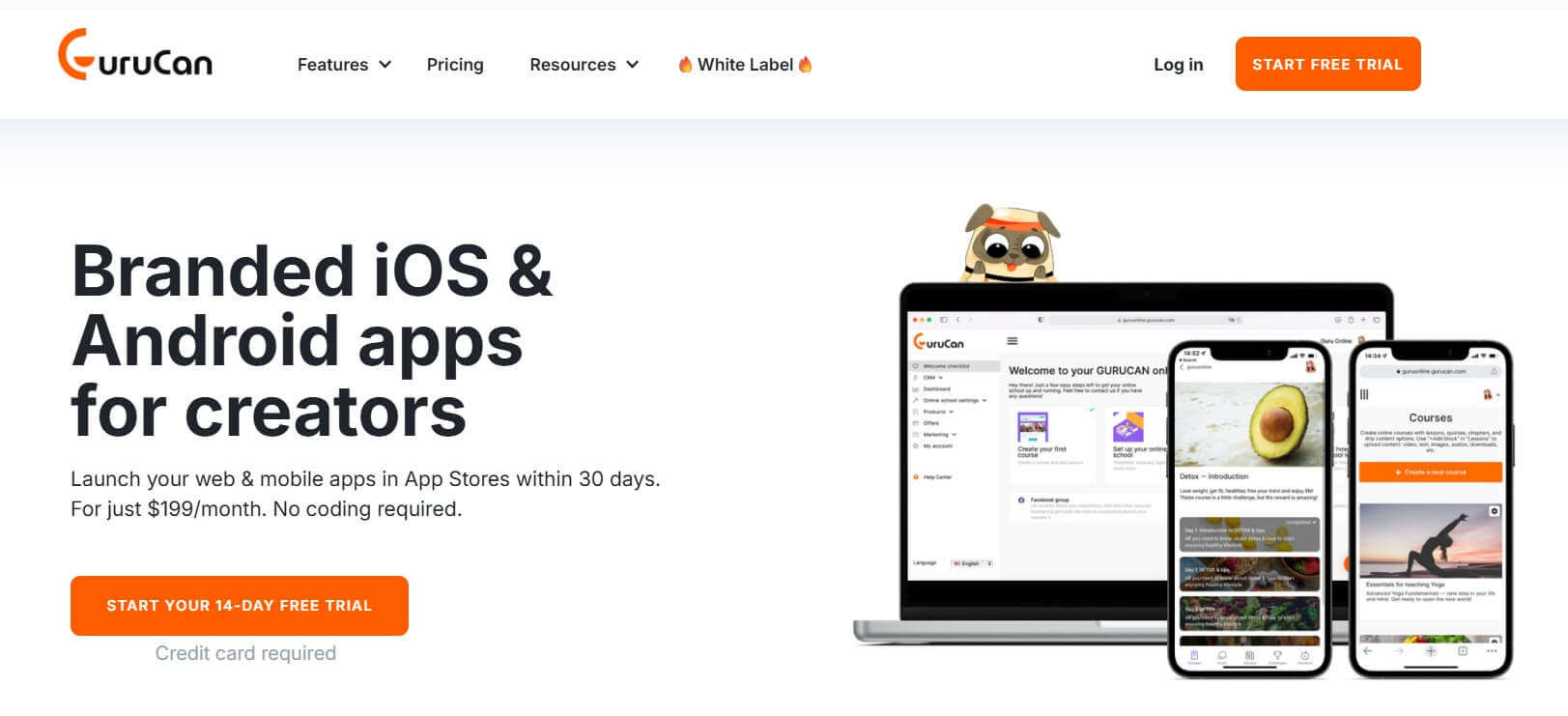





Gurucan is an all-in-one LMS and community app builder with a mobile-first design. It includes chat, push notifications, courses, quizzes, and monetization features—popular among creators and small businesses seeking a fast, user-friendly option with community-building capabilities.
The platform offers native mobile apps and webinar support—making it a compelling learning management system for small companies seeking course delivery and customer engagement in a single platform.
Pros
Cons
Pricing
Gurucan offers three monthly plans:
22. Litmos
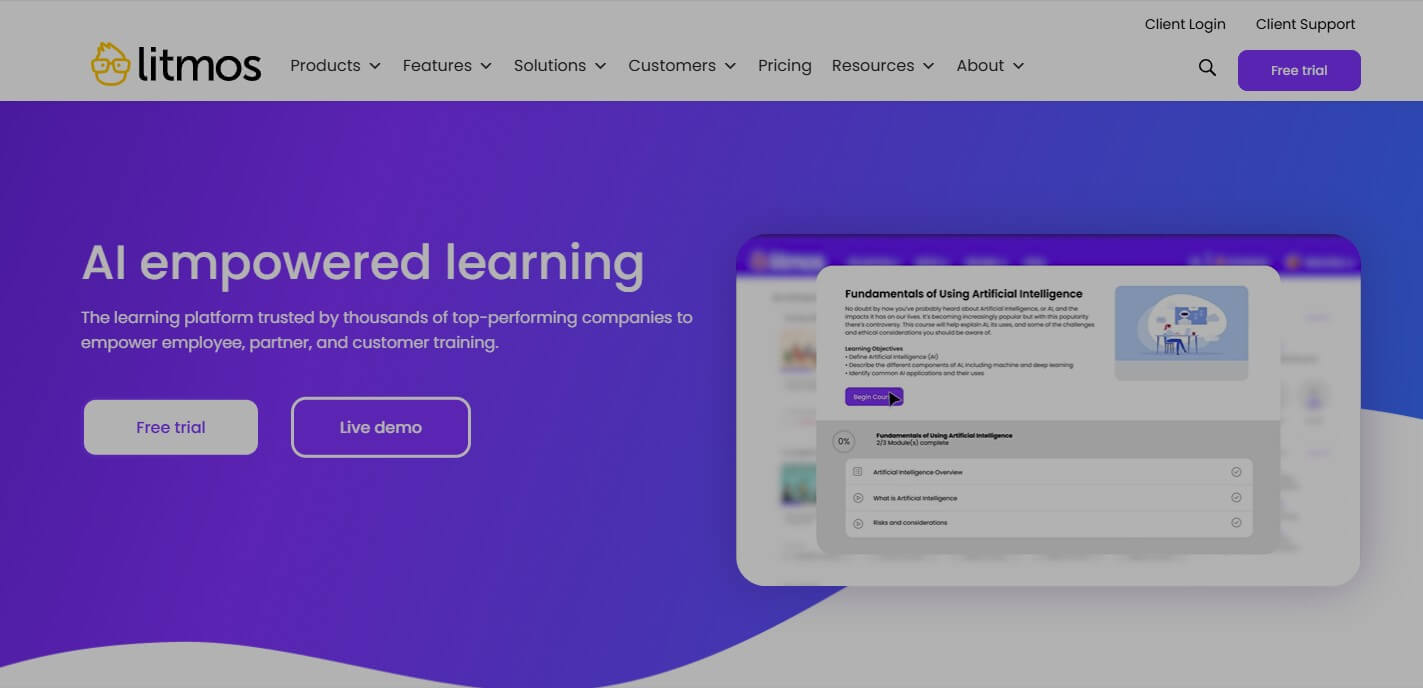





Litmos is a cloud-based LMS designed for fast employee training across global teams. It offers course creation, video hosting, assessments, and built-in content libraries. With multilingual support and mobile compatibility, it’s a scalable learning management system for small companies seeking growth without complexity.
Its intuitive admin interface, SCORM support, and off-the-shelf compliance content make it a strong LMS for small business use cases in retail, healthcare, and finance. Users also have access to automated workflows and tracking features.
Pros
Cons
Pricing
Pricing is available upon request.
23. FreshLearn
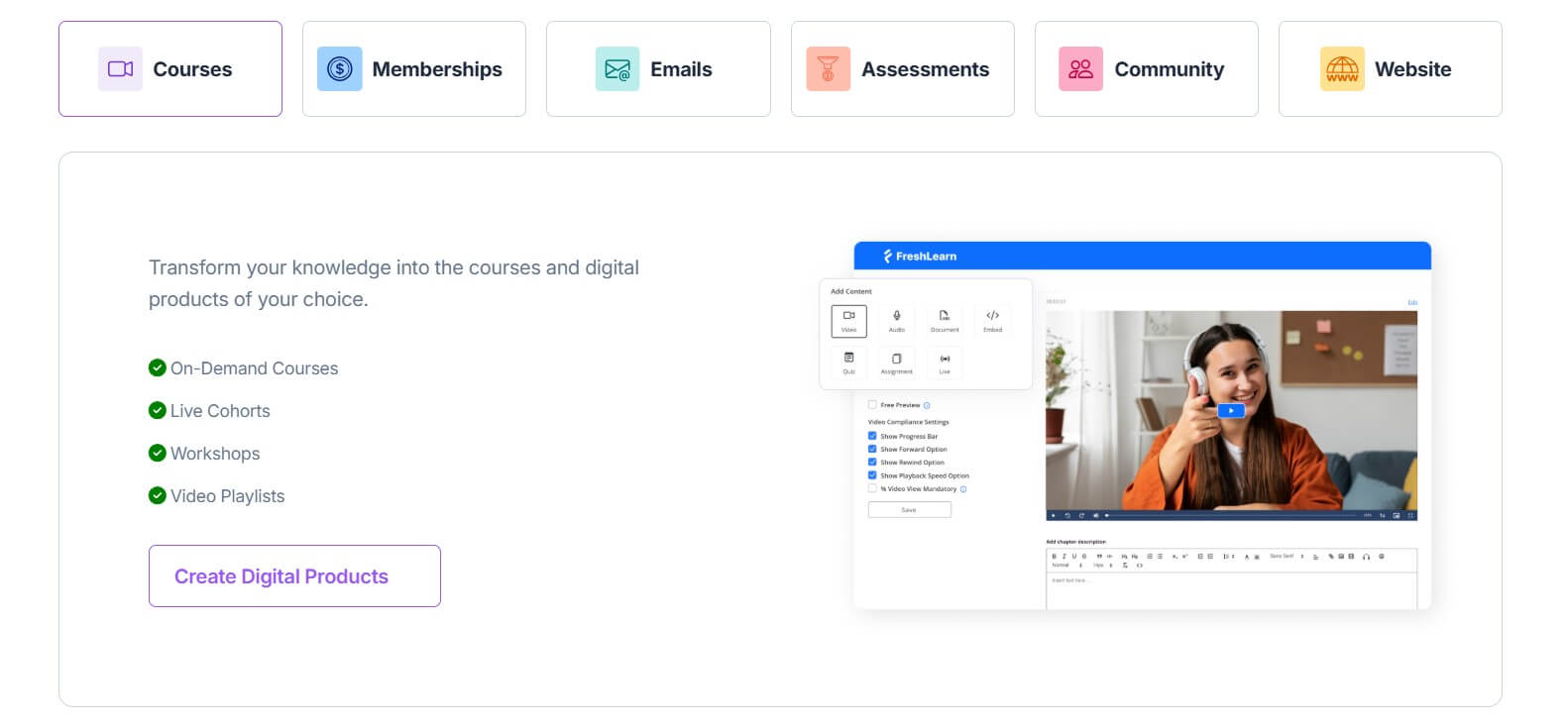





FreshLearn is an all-in-one LMS platform ideal for small businesses and creators wanting to build, market, and sell online courses, live workshops, and digital products quickly. Its mobile app, built-in email, coupons, and affiliate tools provide a robust training software for a small business toolkit in a single platform.
Pros
Cons
Pricing
FreshLearn offers four monthly plans tailored for different business sizes:
*All pricing information contained in this guide was retrieved from each platform’s website in July 2025.
Which is the best small business LMS? Try LearnWorlds to see why it is the top pick
There you have it. This was the list of the best LMS for small businesses. As you can see, small businesses have the same training needs as large ones – onboarding, upskilling, and compliance are issues that concern all companies regardless of size. But for you, it’s even more important to have a user-friendly LMS with excellent support; one that will turn into your training partner!
Learning management systems for small businesses should also be robust and offer the must-have tools you need every step of the way, so make sure you are careful with your decision.
Take advantage of our 30-day free trial now, and start building BIG training courses for your small business with the most comprehensive LMS solution in the market! Discover how LearnWorlds, with its rich learning features, limitless expansion and customization capabilities, and outstanding customer support, is the only tool you’ll ever need to train your people.
15,000+ brands trust LearnWorlds to train their people, partners & customers.

Androniki Koumadoraki
Androniki is a Content Writer at LearnWorlds sharing Instructional Design and marketing tips. With solid experience in B2B writing and technical translation, she is passionate about learning and spreading knowledge. She is also an aspiring yogi, a book nerd, and a talented transponster.
Kyriaki is the SEO Content Manager at LearnWorlds, where she writes and edits content about marketing and e-learning, helping course creators build, market, and sell successful online courses. With a degree in Career Guidance and a solid background in education management and career development, she combines strategic insight with a passion for lifelong learning. Outside of work, she enjoys expressing her creativity through music.
FAQ
Everything you have ever wondered, but were too afraid to ask...

